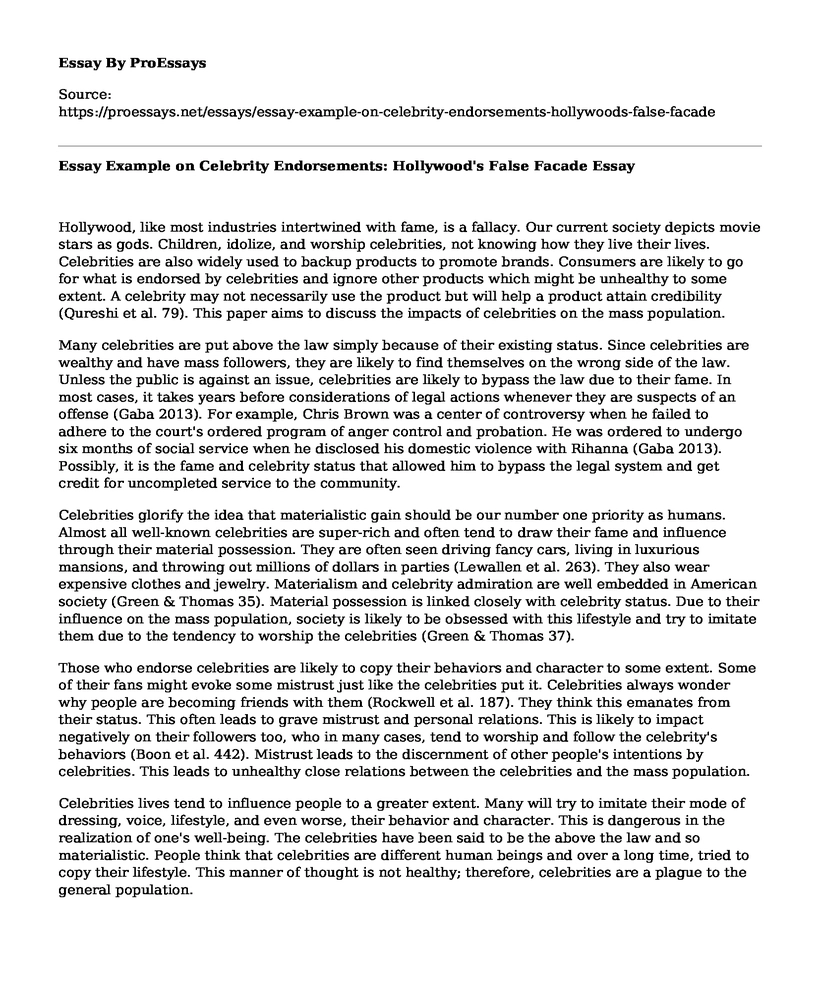Hollywood, like most industries intertwined with fame, is a fallacy. Our current society depicts movie stars as gods. Children, idolize, and worship celebrities, not knowing how they live their lives. Celebrities are also widely used to backup products to promote brands. Consumers are likely to go for what is endorsed by celebrities and ignore other products which might be unhealthy to some extent. A celebrity may not necessarily use the product but will help a product attain credibility (Qureshi et al. 79). This paper aims to discuss the impacts of celebrities on the mass population.
Many celebrities are put above the law simply because of their existing status. Since celebrities are wealthy and have mass followers, they are likely to find themselves on the wrong side of the law. Unless the public is against an issue, celebrities are likely to bypass the law due to their fame. In most cases, it takes years before considerations of legal actions whenever they are suspects of an offense (Gaba 2013). For example, Chris Brown was a center of controversy when he failed to adhere to the court's ordered program of anger control and probation. He was ordered to undergo six months of social service when he disclosed his domestic violence with Rihanna (Gaba 2013). Possibly, it is the fame and celebrity status that allowed him to bypass the legal system and get credit for uncompleted service to the community.
Celebrities glorify the idea that materialistic gain should be our number one priority as humans. Almost all well-known celebrities are super-rich and often tend to draw their fame and influence through their material possession. They are often seen driving fancy cars, living in luxurious mansions, and throwing out millions of dollars in parties (Lewallen et al. 263). They also wear expensive clothes and jewelry. Materialism and celebrity admiration are well embedded in American society (Green & Thomas 35). Material possession is linked closely with celebrity status. Due to their influence on the mass population, society is likely to be obsessed with this lifestyle and try to imitate them due to the tendency to worship the celebrities (Green & Thomas 37).
Those who endorse celebrities are likely to copy their behaviors and character to some extent. Some of their fans might evoke some mistrust just like the celebrities put it. Celebrities always wonder why people are becoming friends with them (Rockwell et al. 187). They think this emanates from their status. This often leads to grave mistrust and personal relations. This is likely to impact negatively on their followers too, who in many cases, tend to worship and follow the celebrity's behaviors (Boon et al. 442). Mistrust leads to the discernment of other people's intentions by celebrities. This leads to unhealthy close relations between the celebrities and the mass population.
Celebrities lives tend to influence people to a greater extent. Many will try to imitate their mode of dressing, voice, lifestyle, and even worse, their behavior and character. This is dangerous in the realization of one's well-being. The celebrities have been said to be the above the law and so materialistic. People think that celebrities are different human beings and over a long time, tried to copy their lifestyle. This manner of thought is not healthy; therefore, celebrities are a plague to the general population.
Works Cited
Boon, Susan D., and Christine D. Lomore. "Admirer-celebrity relationships among young adults: Explaining perceptions of celebrity influence on identity." Human communication research 27.3 (2001): 432-465.
Gaba, S. "Is Celebrity Behavior Above the Law?" The Celebrity Therapist, 27 Dec. 2013, www.beliefnet.com/columnists/thecelebritytherapist/2013/12/is-celebrity-behavior-above-the-law.html.
Green, Thomas, et al. "Materialism and the Tendency to Worship Celebrities." North American Journal of Psychology16.1 (2014).
Lewallen, Jennifer, Brandon Miller, and Elizabeth Behm-Morawitz. "Lifestyles of the rich and famous: Celebrity media diet and the cultivation of emerging adults' materialism." Mass Communication and Society 19.3 (2016): 253-274.
Qureshi, Muhammad M., And Humaira M. Malik. "The Impact of Celebrity Endorsement On Consumer Buying Behavior." Advances in Social Sciences Research Journal, Vol. 4, No. 3, 2017.
Rockwell, Donna, and David C. Giles. "Being a celebrity: a phenomenology of fame." Journal of phenomenological psychology 40.2 (2009): 178.
Cite this page
Essay Example on Celebrity Endorsements: Hollywood's False Facade. (2023, Feb 23). Retrieved from https://proessays.net/essays/essay-example-on-celebrity-endorsements-hollywoods-false-facade
If you are the original author of this essay and no longer wish to have it published on the ProEssays website, please click below to request its removal:
- Love Just a Coincidence - Movie Description Example
- Essay Example: Report of a Concert
- Letter on Difference in Traditions Between America and India
- Is Ethical Concerns of Utilizing Social Media and Digital Platforms in Marketing to Children? - Paper Example
- Film Analysis Essay "An Inconvenient Sequel: Truth to Power"
- Essay Sample on Sustainable Bahrain World Trade Center
- Expanding First Amendment Reach in the Age of Social Media - Essay Sample







